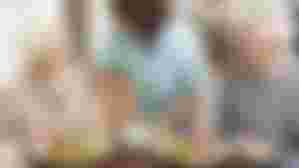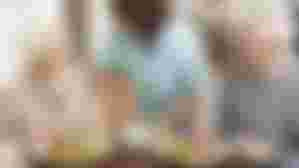In rich countries, the elderly are the group most at risk of nutritional deficiency. And it is that, while in the third age the body has the same nutritional needs, at the same time there are causes that make it difficult to eat properly, such as metabolic diseases, dental problems, poor ability to move, the intake of medications, loneliness, lack of financial resources or loss of taste and smell abilities. For this reason, more than ever, the diet must be adapted to the situation of each person.

Today it is accepted with a broad consensus that by age 70 calorie needs are reduced by 20% in men and 15% in women, it is recommended:
Continue consuming proteins at the same rate, that is, at the rate of one gram per day per kilo of weight, and that fats should not provide more than 30% of total calories, leaving carbohydrates to do the rest.
With regard to vitamins and minerals, the needs are almost the same as in adulthood; an optimal fiber intake should be 25-30 grams per day and in terms of the adequate amount of water, at least two liters.

Translated to food.
This implies that cereals, legumes, potatoes, vegetables and fruits must remain the food base. Daily consumption of dairy products is essential, and if they are skimmed better. Meat and fish should be alternated weekly until taking between 7 and 9 servings. The "extras" should be limited according to the cases, but they should never interfere with the contributions of what is essential.
Solutions
All the eating problems associated with the elderly have their remedies. Here we offer you some:
Dental problems: Modify the texture of food, grind it, make croquettes, purees or juices. This way you will compensate for the failures of a damaged teeth.
Curb constipation: You will achieve this with a diet rich in fiber, vegetables, whole grains, fruit, legumes and nuts.
If you lose taste capacity: Bet on aromatic plants or spices, instead of increasing the consumption of salt or sugar.
If you're never thirsty: Force yourself to drink water. Hydration is essential.
Toast, the breakfast queens:
Toasted bread is very appetizing at any time of the day. And it is often used as a complement to snacks, lunches, dinners, and, of course, breakfast. Despite the habitual consumption of the famous toasts, there are some data that are worth taking into account. It is widely believed that toast bread has fewer calories than soft bread. Well, nothing is further from reality.

The reason is that bread, when toasted, loses water, and as a direct consequence an increase in calories. Whenever you can, opt to toast your bread at home. Keep in mind that commercial toast has added fat and, in most cases, a higher amount of sugar. With homemade toast you will consume 100 fewer calories.
Some of the most frequent questions we ask ourselves:
A diet with 0% fat, is it healthy? Absolutely. Fats are also necessary since they provide us with essential nutrients and promote the assimilation of vitamins A, D, E and K.
Can Lemon Juice Damage Tooth Enamel?
If taken often, it can end up producing this effect, due to its acidity. To reduce contact with the teeth, it is best to drink using an absorbent.
Let's take care of our seniors.


